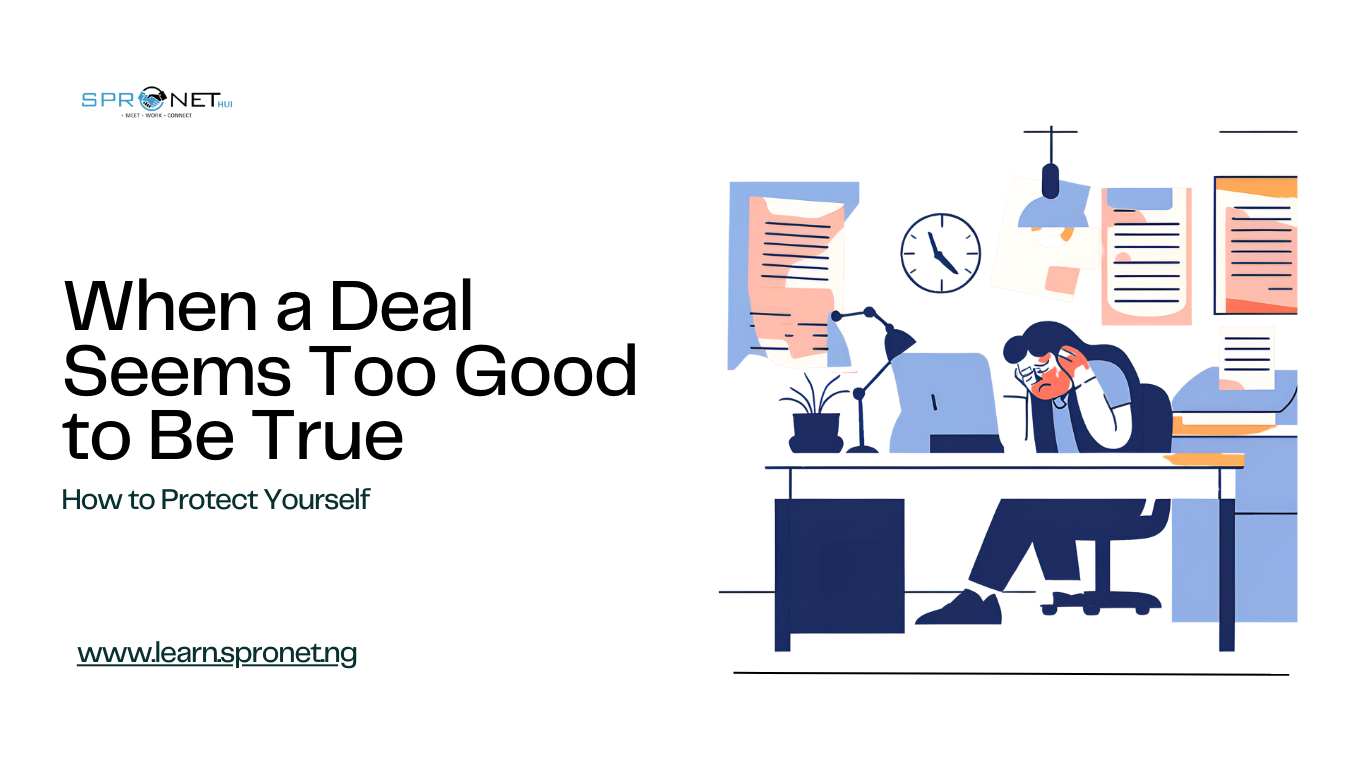When a Deal Seems Too Good to Be True: How to Protect Yourself
In today’s digital age, scams are more prevalent than ever. With the rise of online investments, e-commerce, and other seemingly legitimate opportunities, it’s easy to get swept up by deals that offer unrealistically high returns or quick profits. However, not every offer is genuine. Scammers use psychological tricks to make fraudulent deals look too good to pass up. In this guide, we’ll cover the red flags to watch out for and how you can protect yourself from falling victim to these schemes.
1. Unusually High Returns with Low Risk
One of the biggest indicators that a deal may be a scam is the promise of unusually high returns with little or no risk. Investments with guaranteed returns—especially those that promise returns far above average market rates—are often too good to be true. Legitimate investments, whether in stocks, bonds, real estate, or other markets, always carry some degree of risk.
If you come across a deal promising returns like 10% per month or 50% annually with no risk, you should be skeptical. Scammers use these tactics in Ponzi schemes, investment fraud, and cryptocurrency scams to lure unsuspecting victims. Always remember: high returns always come with higher risks.
2. No Clear Explanation of How the Business Makes Money
Another telltale sign of a fraudulent deal is when there is no clear explanation of how profits are generated. Scammers often hide behind complex jargon or intentionally vague business models to avoid providing concrete information. If the company or investment cannot clearly explain where the profits are coming from, it’s likely a scam.
For example, Ponzi schemes rely on money from new investors to pay earlier participants rather than generating any real profit. Always ask questions and demand transparency. Legitimate businesses have nothing to hide and can clearly outline how they generate revenue.
3. Lack of Proper Business Registration and Transparency
Before committing to any deal or investment, always check whether the company is properly registered with relevant financial or government authorities. A lack of business registration is a major red flag. Legitimate companies are usually registered with agencies like the Securities and Exchange Commission (SEC) or other local regulatory bodies.
Scammers frequently create fake businesses that appear legitimate but have no actual legal standing. You can verify this by searching online databases or requesting registration documents from the company. Additionally, look for contact information and legitimate customer reviews—many fake businesses will lack these crucial elements.
4. Pressure to Join Quickly
If you feel pressured to make a quick decision or are told that an opportunity is “time-sensitive,” it’s time to step back and reconsider. Scammers often create a sense of urgency, pushing victims to make rash decisions without conducting proper research. They may claim that the offer will expire soon, or that you’ll miss out on the “deal of a lifetime” if you don’t act now.
Legitimate investments and business opportunities provide time for due diligence and allow potential investors to think through their decisions. If someone is forcing you to sign up or invest immediately, it’s a red flag. Scams like get-rich-quick schemes thrive on this tactic. Always take your time, and don’t let anyone rush you into making decisions.
How to Protect Yourself from Scams
To avoid falling for deals that seem too good to be true, follow these simple steps:
- Research thoroughly: Look into the company’s background, verify registration, and read legitimate reviews from third-party sites.
- Seek professional advice: If something doesn’t add up, consult with a financial advisor or legal professional before making any commitments.
- Ask questions: Don’t be afraid to demand full transparency. A legitimate business will gladly explain its operations.
- Don’t act under pressure: Take your time and make sure you understand the deal completely before making any financial decisions.
By following these steps, you can protect yourself from becoming a victim of scams and fraudulent deals.
Conclusion: Trust Your Instincts
If a deal seems too good to be true, it usually is. By staying informed and vigilant, you can avoid the traps set by scammers. Always trust your instincts and take the necessary steps to verify any investment or business opportunity before proceeding.
Upsell: Safeguard Your Future with Our Cybersecurity Course
Want to learn more about how to protect yourself from scams and fraudulent deals? Enroll in our Cybersecurity Course at Spronet Hub Academy! This course will equip you with the tools and knowledge to detect online scams, protect your personal information, and navigate the digital world securely. Learn from cybersecurity experts and stay one step ahead of scammers.
Don’t wait—sign up today and safeguard your financial future!

1 Comment.